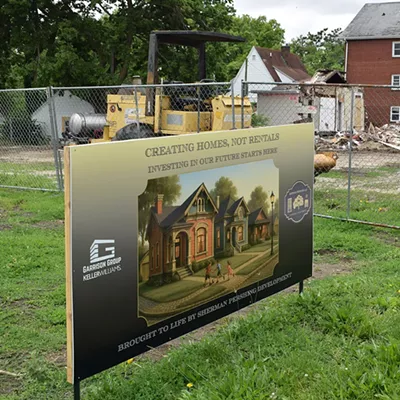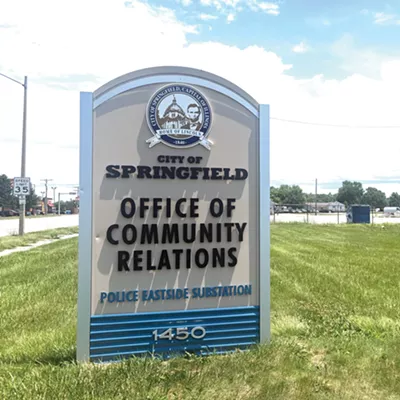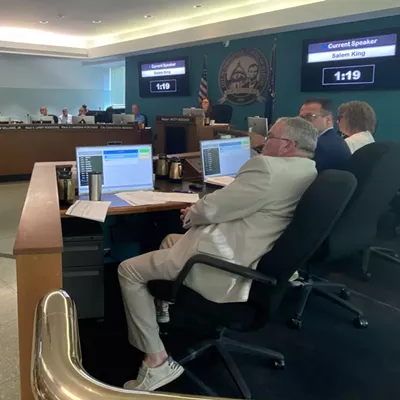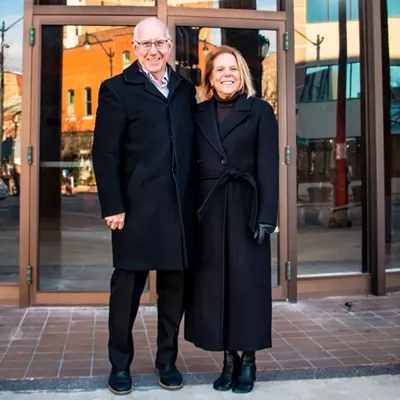By David Blanchette
Corky Joyner has lived in the Springfield area since he was 10 years old. He and his wife, Kelly, are currently residents of Leland Grove. They have been married for 23 years and he has a stepson, Claude, who is in his fourth year at Southern Illinois University School of Medicine.
Joyner has been in the real estate and construction business since 1995 and started his current company, Joyner Construction, in 2007. Notable projects include Ash Grove Apartments and Cobblestone Place Apartments in Springfield, Cardinal Hill Apartments in Rochester, plus numerous new builds and renovations for retail shopping centers, restaurants and offices. He owns and manages around 450 apartment units and 500,000 square feet of office, retail and manufacturing space in Sangamon County.
Where were you born and raised? I was born in Stuttgart, Arkansas, in 1971. My dad worked for Horace Mann Insurance, and he got promoted shortly after I was born and we moved to Baton Rouge, Louisiana. We lived there until 1981 when he got promoted again, and we moved to Springfield. I went to Springfield schools and took a few classes at Lincoln Land Community College. I started my business in 1995.
How did somebody whose dad was in the insurance business get interested in construction and development? I’ve been asked that a number of times, and I’m not really sure. I’ve always been interested in how buildings got built. I was fairly ambitious as a young person. In the early 1990s there was a lot of real estate activity here, and seeing that construction probably got me interested at the time.
I was looking for something that was an interesting job, and construction development, if nothing else, is always interesting and different. I started out working for myself and never worked for anybody else.
Did you have business mentors along the way?
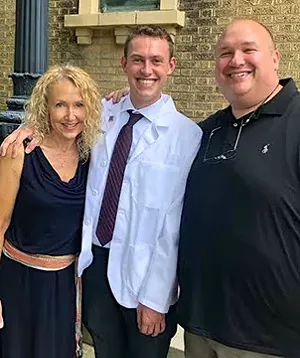
I definitely did. I learned a lot of what to do and a little bit of what not to do by watching some of the people that I was friends and partners with.
When I did my first subdivision I went to Russ Martin, who owned Martin Engineering Company. He was a family friend and lived down the street from us, and I asked if he would help me get into the development business. I had a piece of ground I wanted to build a subdivision on, and he kind of fronted some work to me.
John Klemm helped me also. The second deal I was involved in, I got an option on a piece of ground he owned, and he was very generous and helpful to me. I became partners with John Pruitt, Jim Zerkle and Denny Polk, and I learned a lot from those three guys. I was partners with Mike Ryan in some land development and learned a lot from Mike, as well.
What character traits are a must in your type of business? In all business, doing what you say you’re going to do is very important. The older I get, the easier it is to be straight. Sometimes when you’re younger, it’s a little harder to tell the truth when the truth isn’t easy to tell. But actually, the easy way is to just tell the truth up front to people. If it’s bad news, you might as well deliver it.
The development business in Springfield is not always rosy, and you have high points and low points. So having the ability to be a straight shooter is probably the most important thing.
When you reach some of those low points do you find yourself questioning why you got into this business? Absolutely! Things were pretty good in 2007, but in 2008 things got very difficult and stayed that way until about 2011. So yeah, there was a time when I thought I would never recommend this business to anyone because things had gotten very, very difficult.
The end result for me was it made me a significantly better business person. I started running my business differently. I don’t know if formal training would have helped me, because most of the people were in the same boat as me and had the exact same problems as I did.
How is the development business today in Springfield? I would say middle-of-the-road. Springfield is a big small town; it’s not an easy place to do business. The benefit here is there’s not a lot of competition, but it is a good place for certain types of development.
At one time I had a lot of subdivision development, then I was doing a lot of retail. Recently, I’ve been doing mainly multifamily residential stuff. There was a need for all of those things at the time I was doing them. Being able to see that market segment need and having the ability to fill the need is important. I don’t know what the next one is, because right now I don’t see a need that’s not being filled.
What gives you the most satisfaction in your career? Success always satisfies me. In this big small town, you hear things when you start a project, such as, “That’s never going to work.” So when it actually does work, there’s some satisfaction. It’s not an “I told you so” thing, it’s about the ability to see a need and fill it.
We want to invest where jobs are being created, and that’s what we’ve done here. You’re creating something that’s going to outlive you, and there’s satisfaction in that.
What advice would you give to young people who are just starting on a career path? Work harder than your competition. Always try to find the people who are the best in your industry and don’t compete down, compete up. And do what you say you’re going to do.
What would people be surprised to learn about you? I quit drinking a little over 11 years ago and needed something to fill the void because all I was doing was working. Several of my friends suggested I learn to fly. So I went for a flight, and we took pictures of the Cobblestone development. That was my introduction to flying, and I’ve been flying ever since.
I’m rated to fly jets, single- and multi-engine planes and seaplanes. I’m a flight instructor for single-engine, multi-engine and instrument flying, and I own my own airplane. I’m pretty proud of it; it’s a unique skill to possess. Plus, it’s a lot of fun.


